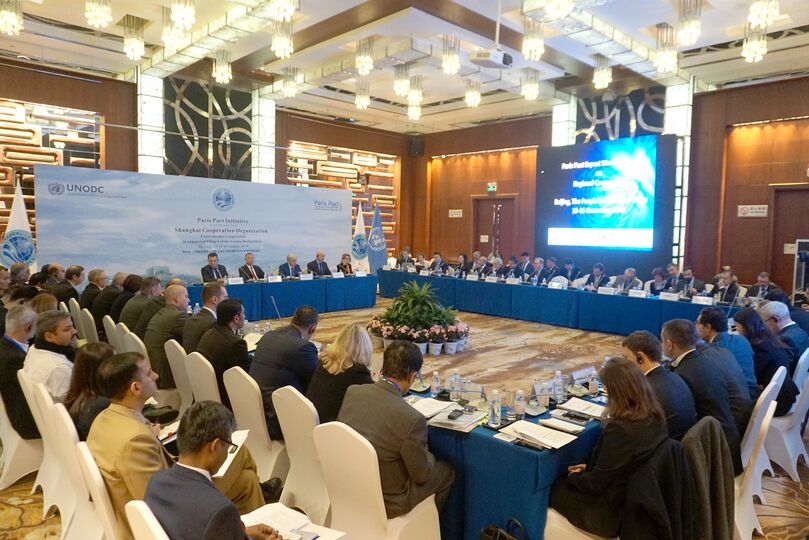A three-day conference of the leading experts on cross-border cooperation under the Paris Pact Initiative (PPI), which was established to combat illicit traffic in opiates originating in Afghanistan, opened in Beijing on 13 November 2018. The event has brought together 70 top and senior drug enforcement officials from 18 countries and 10 international organisations.
"The high-level meeting of PPI experts in Beijing is an opportunity to share experience and exchange information on the latest methods of combating the drug threat," SCO Secretary-General Rashid Alimov said in his opening remarks. He cited examples of practical anti-drug cooperation within the SCO framework.
In particular, Rashid Alimov said that between 2011 and 2017 the concerned agencies of the eight SCO countries confiscated over 180 tonnes of heroin, 340 tonnes of opium, nearly 1,500 tonnes of marijuana and 1,600 tonnes of hashish. In other words, 40 percent of heroin and marijuana and over 25 percent of hashish confiscated in Eurasia were seized in the SCO member states. The SCO Secretary-General sees this as "evidence of the SCO's ability to effectively combat the drug threat across Eurasia." He added that "the SCO will continue to build up its efforts against the drug threat."
Rashid Alimov also said that "completely eradicating the global drug challenge calls not only for adopting substantiated, balanced and coordinated measures at the national and regional levels, but also for practical interaction and cooperation on a global scale." He added that since its inception, "the SCO has been working consistently to develop and strengthen cooperation with the UN and its specialised agencies, primarily the Office on Drugs and Crime (UNODC), as well as with other international and regional anti-drug organisations."
The SCO Secretary-General provided examples of such cooperation within the SCO and the Paris Pact Initiative, saying that they have created the basis for "a coordinated, balanced and comprehensive search for sound and effective solutions to the global drug problem."
"The SCO, working together with the UNODC and the PPI, is ready for this despite inevitable risks and obstacles on this path," he said.
Other speakers at the opening ceremony were China's Deputy Minister of Public Security Liu Yuejin, representative of the UNODC Country Office for Afghanistan (UNODC COAFG) Mark Colhoun and Paris Pact Coordinator Marie-Anne Menier. The three-day conference will be moderated by Tofik Murshudlu, Chief of the Implementation Support Section of the UNODC Organised Crime Branch.
SCO Secretary-General Rashid Alimov and China's Deputy Minister of Public Security Liu Yuejin held a meeting with the UN delegates at the conference.
The conference participants will visit several Chinese drug enforcement divisions.
It is the first meeting held under the PPI at the SCO Secretariat. The participants will adopt draft recommendations following their meeting.
It is the first meeting held under the PPI at the SCO Secretariat. The participants will adopt draft recommendations following their meeting.
Over the 15 years since its inception in 2003, the broad international coalition known as the Paris Pact Initiative (PPI) has evolved into one of the most important frameworks for combatting illicit traffic in opiates originating in Afghanistan.
The Vienna Declaration, which was adopted at the Third Ministerial Conference of the Paris Pact Partners in 2012, embodies a roadmap for Paris Pact partners on their responsibility to strengthen and implement regional initiatives, detect and block financial flows linked to illicit traffic in opiates, prevent the diversion of precursor chemicals used in illicit opiates manufacturing in Afghanistan and reduce drug abuse and dependence through a comprehensive approach.
The Shanghai Cooperation Organisation is one of 23 Paris Pact partners.
